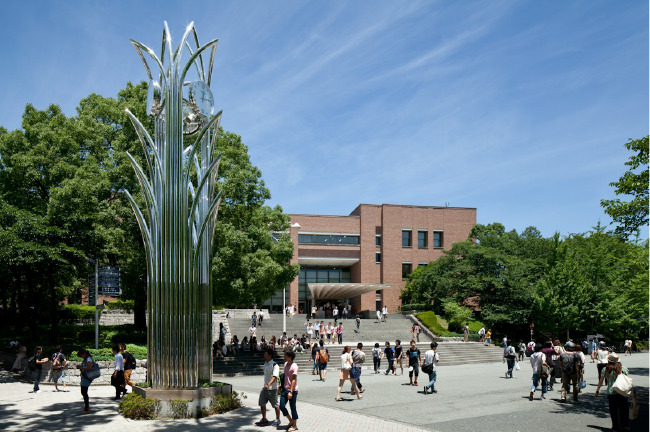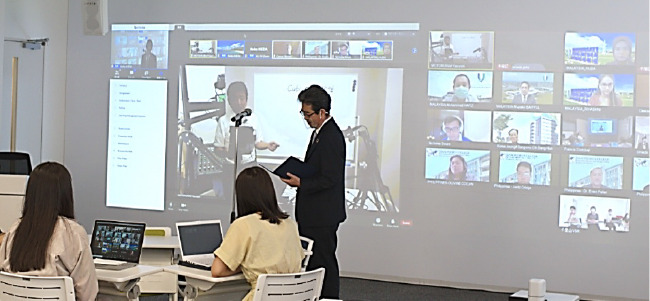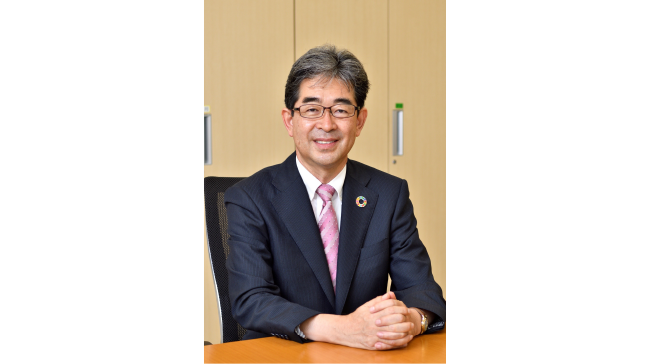In recent years, Kansai University has been actively introducing systems and lectures using digital technology.Behind this is the practice of education that fosters "thinking power" and "innovative power" and inclusive education, which was shown in the medium- to long-term vision "Kandai Vision 150" that was formulated to celebrate the XNUMXth anniversary of its founding in XNUMX. The goals are promotion, visualization of learning outcomes, and realization of learner-oriented education.We interviewed Vice President Takao Fujita about the "now" of Kansai University, which utilizes advanced digital technology to vigorously promote university-wide initiatives.

Transform into a learning scene by utilizing cutting-edge digital
Kansai University, a school corporation, draws a concrete future image in the four fields of "education," "research," "social contribution," and "organization management" in "Kandai Vision 150," which is an action guideline for the next XNUMX years. At the same time, we have set policy goals for each field in the first XNUMX years.In the field of education at universities and graduate schools, students take the initiative in developing the ability to think, act, and reform society in a globalized society- "thinking power" and "innovative power". There is an urgent need to transform into an educational method to learn from.
A pillar measure for this is the development of an environment for "education that makes full use of digital technology," including ICT utilization education based on BYOD (Bring Your Own Devise). From XNUMX, we recommend BYOD (Bring Your Own Devise), where students bring their own laptops to the campus to study.A Wi-Fi environment has been set up in the school, and students can create reports and presentation materials, and not only conduct daily learning activities such as preparation and review using a learning support system (LMS), but also search for courses using a syllabus and register for courses. We utilize digital devices such as personal computers for grade announcements, report submissions, and job hunting activities.
Then, in March XNUMX, two initiatives were adopted in the Ministry of Education, Culture, Sports, Science and Technology's "University and Higher Education Advancement Plan (Plus / DX)", which led to the transformation of existing systems and social transformation. We believe that DX (digital transformation) will be the driving force for this, and formulate the "Kansai University DX Promotion Plan". Set three-year goals centered on the four points of "reduction and removal of restrictions and restrictions on student learning opportunities," "visualization of learning outcomes," "infrastructure and environment improvement for DX promotion," and "efficiency of on-campus work." , We are working on the university-wide realization of a "blended education model" that utilizes remote and face-to-face learning spaces in a hybrid manner.
In particular, we are focusing on "visualization of learning outcomes" that makes full use of digital technology, and we are working to significantly enhance the functions of Kansai University LMS (Learning Management System), an educational support tool used for testing and submitting reports. We are creating a system to grasp the learning history and proficiency level in detail.
Vice President Fujita:"Once this system is completed, by grasping the courses and proficiency levels up to now, the field of interest will be clarified. For the second and third graders, what should be learned next? We are wondering if there will be a mechanism to present guidelines. In the past, seminar faculty members had mainly played the role in specialized fields, but this system also enables advice on learning outside of specialized fields. Furthermore, in cooperation with the Career Support System (KICSS), we plan to build a career development system from entrance exams to graduation and employment, and provide career support optimized for each student. "
Further enhance online lessons with an on-demand system
As a countermeasure against the corona disaster that occurred in the spring of 2020, online classes have rapidly progressed.At Kansai University, in the spring of XNUMX, XNUMX% of all lectures will be face-to-face and the rest will be conducted online.GSC (Global Smart Classroom), a platform for online lessons that is currently being introduced, provides quality that allows students to actively participate in lessons held on campuses other than their affiliation without losing their sense of presence. I'm proud.In the future, in addition to real-time online lessons where you can access and participate at designated times, there will be on-demand lessons where you can watch videos of the lessons at your own convenience. is.
Vice President Fujita:"It has become clear that the on-demand format can efficiently handle lessons for a large number of people. We will identify lessons suitable for both the on-demand format and the real-time format, and provide guidelines on how to design both lessons. We have created and are working to enhance the online system. The biggest merit of online lessons is the relaxation of time and space constraints, but both when responding to questions from students and when having students present their results during lectures. The challenge for the future is how to secure the direction. We are considering arranging courses so that the disadvantages can be minimized while taking advantage of online. "
For on-demand lessons, we have introduced a safe and highly stable lecture recording and distribution system "Panopto".Since viewing logs can be collected in cooperation with Kansai University LMS and the number of views by student or scene can be aggregated and analyzed, it will be possible for teachers to improve the content and utilize it for flipped classrooms.In addition, students can see the material screen and the teacher's lesson screen at the same time, and can learn effectively at their own pace, such as leaving notes in any part and watching repeatedly.Furthermore, as an initiative to reduce and remove restrictions, restrictions, and barriers for students' learning opportunities, we are aiming to create an environment that is easy for all students to learn by using AI to create an inclusive campus.It is said that online lessons that alleviate various restrictions in conventional lessons will continue in parallel with face-to-face lessons even if the corona sickness converges in the future.
Collaborative lessons that connect with overseas students from within the university
Kansai University has introduced the latest digital technology into its internationalization strategy.
Vice President Fujita:"Since XNUMX, Kansai University has set up the" Triple Eye Initiative (named after the acronym of Intercultural Immersion Initiatives) "as a cross-cultural immersion education concept with the aim of creating an environment for producing the next generation of global human resources.The idea is that Japanese students and host students will experience various training and study abroad programs using English both inside and outside the university, and will develop not only communication skills but also cross-cultural adaptability supported by empathy, creativity, and positiveness. "
One of the realizations is participation in "COIL (Collaborative Online International Learning)" from XNUMX, which was the first in Japan. COIL is a collaborative lesson project developed by the State University of New York to study online with overseas universities.At Kansai University, we cooperate with university faculty members and staff from other countries through our own matching site, and both student teams discuss in real time with students from the other country through the screen, and record with countries with time lag. We are working on project-type learning, such as deepening exchanges and learning by utilizing it. The KU-COIL network is currently spread to countries such as Taiwan, South Korea, Malaysia, Mexico, China, Brazil, Tanzania and Indonesia, and classes incorporating COIL are available in sociology, politics, business, law, medicine, physics, chemistry, etc. It covers a wide range of fields such as engineering.

Vice President Fujita:"The essence of COIL classes is to learn, interact and deepen understanding with students from different cultures. Studying abroad is a good opportunity to be surrounded by foreign languages and cultures, but with time and financial constraints. If you participate in COIL, you will be able to experience different cultures while you are in Japan. In order to provide effective learning, how do you match overseas classes with our classes, starting with class design? I'm always thinking about what to do. "
Students who have experienced COIL have improved their foreign language proficiency even in a few weeks of the program.In the future, we plan to verify not only literacy but also changes in competencies such as problem-solving ability and attitude toward different cultures, which will lead to further program improvement.
In addition, as part of the further promotion of the Triple Eye concept, we are planning to increase the number of foreign students by providing generous support such as employment promotion programs in Japan for foreign students.
Vice President Fujita:"Internationalization and understanding of different cultures can be experienced even in a non-special environment. You can speak at COIL and study abroad while in Japan if students reach out at Kansai University. We take students to the front of the door to a new world and spare no effort to support them in opening the door to the future. Kansai University will continue to utilize digital, time and space.・ We will create opportunities for learning that transcends boundaries such as different cultures. "


